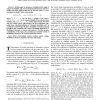Free Online Productivity Tools
i2Speak
i2Symbol
i2OCR
iTex2Img
iWeb2Print
iWeb2Shot
i2Type
iPdf2Split
iPdf2Merge
i2Bopomofo
i2Arabic
i2Style
i2Image
i2PDF
iLatex2Rtf
Sci2ools
137
click to vote
CORR
2008
Springer
2008
Springer
On Unique Decodability
In this paper, we propose a revisitation of the topic of unique decodability and of some fundamental theorems of lossless coding. It is widely believed that, for any discrete source X, every "uniquely decodable" block code satisfies E[l(X1;X2;. . . ;Xn)] H(X1;X2;. . . ;Xn) where X1;X2;. . . ;Xn are the first n symbols of the source, E[l(X1;X2;. . . ;Xn)] is the expected length of the code for those symbols, and H(X1;X2;. . . ;Xn) is their joint entropy. We show that, for certain sources with memory, the above inequality only holds when a limiting definition of "uniquely decodable code" is considered. In particular, the above inequality is usually assumed to hold for any "practical code" due to a debatable application of McMillan's theorem to sources with memory. We thus propose a clarification of the topic, also providing an extended version of McMillan's theorem to be used for Markovian sources.
Related Content
| Added | 09 Dec 2010 |
| Updated | 09 Dec 2010 |
| Type | Journal |
| Year | 2008 |
| Where | CORR |
| Authors | Marco Dalai, Riccardo Leonardi |
Comments (0)

